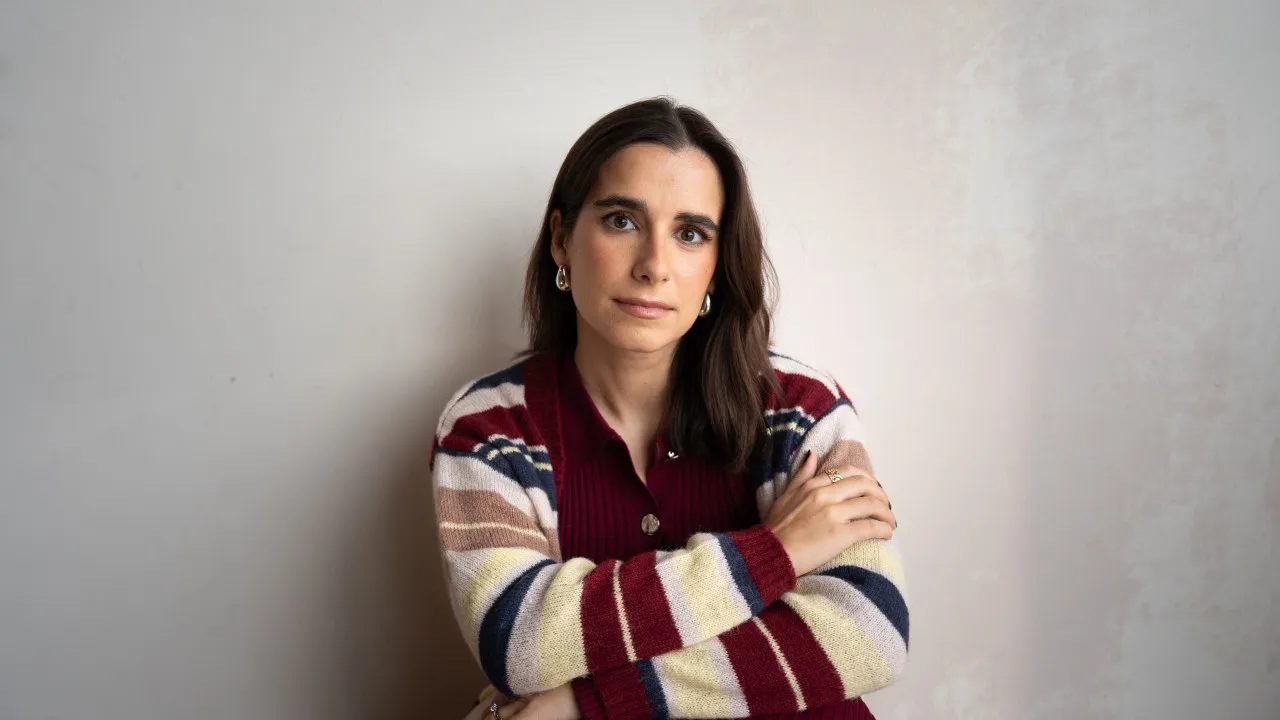
Maria Francisca Gama is emerging as one of the promising figures in Portuguese literature. She penned her first book at the age of 15, but gained fame primarily through “A Cicatriz,” an impactful story released in 2024.
This year, she returns with a new novel titled “A Filha da Louca,” addressing contemporary topics such as mental health—specifically borderline personality disorder, parent-child relationships, and grief.
In a conversation with Notícias ao Minuto, the writer explained that this plot is aimed at a more mature audience, leaving readers in a state of “apnea,” something that didn’t happen in “A Cicatriz,” which focused on a traumatic event.
How have the reactions to this new book been?
So far, the feedback I’ve received has been very positive. Of course, I wanted people to enjoy reading it, but I wasn’t sure what to expect. This book is quite different from “A Cicatriz.” Given the proximity of that book, released in February of last year, and as it was widely read, comparisons are inevitable, and in that sense, I was unsure what to expect. I am pleasantly surprised.
In “A Filha da Louca,” at least from what I’ve been told, there’s a sense of apnea throughout the book, and there isn’t a dramatic moment, like there was in “A Cicatriz.”
Were you afraid of that comparison?
Not afraid… Generally, books and art are subjectively evaluated by the reader or listener. But it’s normal that we compare something after reading it. I know “A Cicatriz” and “A Filha da Louca” are very different books. I believe “Filha da Louca” might appeal to an older audience than “A Cicatriz.”
As I grow and read more, what I write is also becoming more adult-oriented, and my only concern was whether the younger audience would understand and appreciate the book, or feel that their expectations weren’t met, as it doesn’t focus on a traumatic event. In “A Filha da Louca,” at least from what I’ve been told, there’s a sense of apnea throughout the book, and there isn’t a dramatic moment, like there was in “A Cicatriz.”
What led you to write the story of Matilde, the main character, in this new book?
It came about because I came across a news story in 2023 about a case where a child lost their life and the mother was convicted for failing to assist. At the time, I was very disturbed by it, because it seems against nature for a mother not to do everything in her power to protect her child. Instinctively—and it serves as a defense—I thought that mother must have had some issue, she couldn’t have been in her right mind because a mother brings children into the world to care for them and protect them.
I then began writing about this idea of a mother not being who she should be, but I didn’t yet know the direction the story would take. I started writing, as I always do, about this mother-daughter relationship, so different from the one I have with my own mother, who is very close and is my best friend.
Sometime later, I came across another news piece, a journalistic report on borderline personality disorder, and I found the interviewee’s courage in describing the whirlwind of emotions they had to live with every day intriguing, that unique sensation of feeling pain a million times more. I thought this disorder could be at the core of the story, from Matilde’s perspective.
One thing these patients often say is that their whole life, until diagnosed, they thought they—and others—were bad people.The topic of mental health was significant for you.
It’s one of the things I wanted to explore in the book because today we talk more and more about mental health, but we still have a big step to take to discuss illness. Many individuals remain undiagnosed, and borderline personality disorder, in particular, is often confused with personality. One thing these patients often say is that their whole life, until diagnosed, they thought they—and others—were bad people. I find it interesting to bring that to fiction.
At one presentation, a reader told me a sentence from the book was key to reconciling with her mother: my mom, if she could, would not be like this.How did you develop Matilde’s mother, who has this disorder?
I wanted people to empathize with her. When writing a book, I like to create people, have them surpass the barrier of being fictional characters. While I appreciate readers give me the benefit of creative capability, it’s flattering if people think my books are about me, and the characters are real people. It indicates the characters are well-constructed, mirroring our own existence. We are not perfect, neither wholly good nor bad, saying one thing and doing another… It’s very human.
Clara [Matilde’s mother] isn’t bad and doesn’t wish ill for her daughter, and it’s interesting to see how something positive, a mother’s love, can become suffocating. I wanted people to empathize with her.
Many feedbacks I’ve received are from children who saw their parent in the story. At one presentation, a reader told me a sentence from the book was key to reconciling with her mother: my mom, if she could, would not be like this. This is where literature triumphs when we find something in a book that resonates personally with us.
My grief, what I experienced then and continue to experience 10 years later, is very different from what Matilde goes through.Matilde also loses her father. Is there a bit of yourself in this, given you also lost your father during adolescence?
Naturally, my experiences always somewhat infuse my books. However, this grief is profoundly different from mine, due to both the relationship the character had with her father and the relationship I had—and still have—with mine.
My father and I were very close. He was, in fact, the prime supporter of my dream to be a writer since childhood, believing, perhaps overly enthusiastically, that I would become one, and was very proud of me and my sister, being a very devoted father.
Hence, my grief, what I experienced then and continue to experience 10 years later, is very different from what Matilde goes through. In adulthood, a new question hovers around her, likely difficult: usually, parents say their children are the most important people in their lives. Here, throughout the story, it seems the father adores the daughter but adores the mother more, desiring her happiness even at the daughter’s expense. This also diverges from my experiences.
For those who don’t yet know Maria, how did writing enter your life?
I am a lawyer, though I haven’t practiced in three years. My love for reading is thanks to my parents who gave me many books. I frequented the Leiria library, where I grew up, participated in story hours, turning into an avid reader from a young age.
During pre-adolescence, when people read blogs, I created one, writing nearly daily, almost like a diary, composing many letters. At 15, I wrote my first book, my second at 17, both aimed at young readers.
Studying law, I aspired to balance both fields, but eventually decided to pursue writing and communication, as they seem more compatible.
The degree and bar association remain, my registration is suspended, but I prefer not to return to practicing law.Was law a plan B? Has it fallen by the wayside?
Currently, I enjoy writing so much, and in that sense, while possible, since it’s a slightly more unstable career, I would prefer not to return to practicing law. But the degree and bar association remain, my registration is suspended, and I prefer not to return to it [she laughs].
What surprised you the most about becoming a writer?
In my journey, the reader reception was a surprise. I never imagined, not even in my wildest dreams, that so many people would be reading my work, which is really surprising. Despite being a profession where I spend a lot of time alone, I spend much time conversing with readers at libraries, book fairs, and festivals, which is quite different from my initial image of a writer. I thought writers always stayed at home, almost like in a cave, and today it’s different because readers demand it.
Besides that, how do you handle negative reviews?
Well, at first, I would worry if everyone liked it. I’m prepared for some people to like it and others not.
Regarding “A Cicatriz,” I read many opinions that suggested I could have done some things differently, that the ending could have been different, a range of things that are normal… Most writers, when detached from their work, would want to change things without anyone noticing.
There is a set of critiques that aren’t fruitful, which won’t improve my work, and I protect myself because, at the end of the day, what’s important is that both my publisher and I believe it’s worth sharing with others, and from there, the work finds its path.
Now that you’ve released this book, are you thinking about your next story or simply enjoying the moment?
It’s very difficult to rest, and fortunately, I have many ideas, which is great because many don’t materialize into anything. Currently, I’m not writing; I’m in the book promotion phase and trying to rest as I’m nearing motherhood.
As you’re about to become a mother, do you think the world of reading and literature is in good hands for future generations?
Yes, there are more and more readers. I believe publishers are investing in new Portuguese authors.
Books don’t compete with each other. People can read my three books and then read the three books of any other Portuguese writer of my generation.Do you find this competition with foreign authors to be a bit of a thankless battle?
No, I find it hard to believe that. There’s no book preventing someone from reading another’s book. Books don’t compete with each other. People can read my three books and then read the three books of any other Portuguese writer of my generation. Books have the unique ability to reflect individuality. So, I’m very pleased when I see someone reading, because I think a country that reads is a more advanced country, one that aspires to be something, and also because a person who reads is one step closer to reading one of my books.




